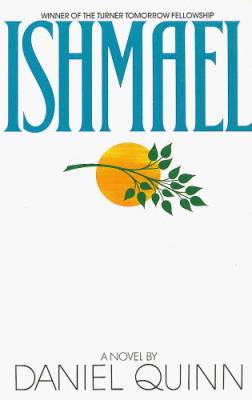Modern man's original sin, which nettles me each time I fly home, or drive further than is essentially necessary:
"You’re captives of a civilizational system that more or less compels you to go on destroying the world in order to live."This book held sadness for me but some wise lessons and hope.
It asks what myths our culture has. A myth doesn't have to be completely fantastical to be a myth, just a story of the world that captures culture's beliefs and values. Some civilized myths I see are a tidy linear notion of progress, a belief in the exceptionalism, superiority, and unity of any nation, and the idea that we all have access to the same opportunities and gifts in life. The core myth that Ishmael examines is the evil human conception that the world is made for us; that the natural world has value solely as its useful or enjoyable to people. As Ishmael points out, this belief has had severe consequences in an ecological instant. Like any belief or model that diverges too far from reality, it must eventually and painfully deflate.
I think the implicit belief that the world exists for our use and convenience does seem to be reflected in many of our actions, and we may be heading towards a point when that belief could collapse. Human Appropriation of the Products of Photosynthesis estimates that our species is consuming or displacing 40% of the biomass of the planet. This is such a large percentage where we can no longer count on the rest of the system to stabilize itself and our contributions to the load; we can easily throw the entire system out of balance.
Another critical message of Ishmael is that our window of time of recorded history is a minuscule slice of time on evolutionary, planetary, and cosmic scope. Events we think of as ancient history are a few hundreds of generations ago; stories enacted by creatures so genetically near to us as to be indistinguishable. Our few thousand years of experience of abjuring our place in nature and trying to chart our own history weigh against the few million years of stability achieved by mankind prior to that, and the hundreds of millions of years organized life has survived and thrived prior to that. If that stability seems threatened now, our lack of perspective, alienation and self-centered values are to blame.
Many of creation myths we are familiar the place man somewhere between gods and animals, showing our powerful tendencies to place ourselves above the herd. Accepting that instead we are short-lived conscious animals produced after epochs of selection and made of the same cosmic muck as the rest of the world actually feels pretty liberating.
It's not too late to redeem ourselves, though the world is churning forward recklessly fast. We can accept our place in natural life as a fascinating and unusually social twig on the great evolutionary tree of life hundreds of millions of years old, and recognize that though we live and die in a few score trips around the sun, this planet or others can play host to thriving life for a few billion years. We are not the final culmination of natural or intelligent life (nor is evolution the kind of optimization process that produces a final culmination) but we are clever, powerful and perhaps wise enough to act as stewards, not masters, of this bequeathment of life, for a time.
In terms of what forms our society might take to meet such ends I'm not sure.
How can we undo the hateful parts of the future we are barreling towards? Still on my reading list,
Whole Earth Discipline proposes nuclear power and dense urbanism. Population-wise we are likely already over our planets sustainable carrying capacity, so I think slowing or reversing that growth is essential. I think much of the work to be done is social and spiritual as Gary Snyder suggests (http://forums.delphiforums.com/n/main.asp?webtag=overpopulation&ctx=&cacheTag=59-25&msg=1333.2); we need to undo fearful and compulsive thinking, both individually and collectively, to enable us to live in the world compassionately and without avarice. Goal is that we may be able to demand less from the ecological web we are begrudgingly part of, without abandoning the knowledge, technology, or connectivity we have gained to date, so that we and untold generations to follow may live peaceful, prosperous, meaningful and fulfilled lives that our ancestors, foragers or farmers, would be proud of.
Footnote:
Ishmael spends a fair bit of time discussing the conflict between "Leavers" & "Takers", low-population foraging people and sedentary, domination-oriented agriculturalists. One recent take I read about this conflict and transition (Coevolution of farming and private property during the early Holocene) which is discussed here:
http://lordoftheapes.blogspot.com/2013/06/agriculture-and-property.html talks about how the development of agriculture is closely tied to property rights; a farmer can gather in times of plenty and then not be compelled to share that surplus in times of famine. Agriculture and property rights are a bit of a chicken-and-egg phenomenon, but they compose an evolutionarily stable strategy in simulation, which may, for moral and ecological better or worse, explain their dominating spread.


